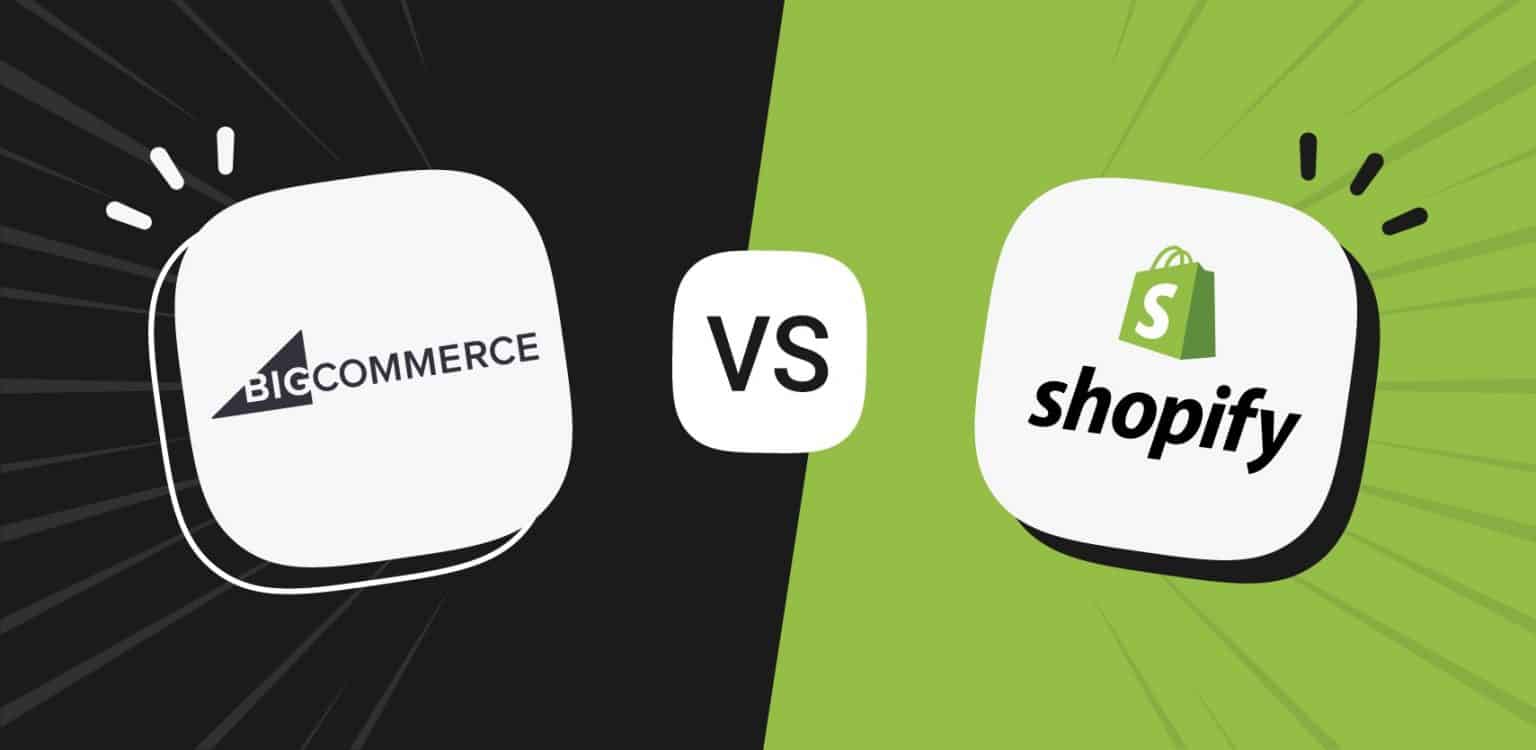Sell custom products with Printify
Choosing the eCommerce platform that fits your business needs is essential. Two of the biggest players in the industry are BigCommerce and Shopify. Both are popular options – for good reasons. But which one is the best fit for you?
We’ll dive deep into both platforms’ merits, pricing, and features to help you make an informed decision.
What is BigCommerce?

BigCommerce is a software-as-a-service (SaaS) platform for building and creating your eCommerce store. Currently, there are over 46,000 active stores on the platform.
It offers a wide range of features while keeping prices affordable. Well-known companies and institutions that use BigCommerce include Procter & Gamble, the State of Wyoming, GE Appliances, Olay, Wired Italia, and One Kings Lane.
What is Shopify?

Shopify is one of the most popular eCommerce website builders, with over 4 million active websites in 2023. That includes some of the world’s biggest brands like Anheuser-Busch (the parent company of Budweiser), Heinz, the Lakers Store, Nestlé, Netflix Merch Store, Minecraft, Penguin Books, PepsiCo, and Sephora.
Shopify has many handy features and specialized apps to help you build and manage a successful online store.
The platform’s relatively low start-up costs, customizable templates, and setup speed are attractive features for anyone looking to open a Shopify store.
Note
Shopify Lite offers only a few features to sellers and is not featured in this comparison.
At a glance: Shopify vs BigCommerce
| Shopify vs BigCommerce | BigCommerce | Shopify |
|---|---|---|
| Pricing | Flat-rate subscription fee, no transaction fees, 15-day free trial. | Flat-rate monthly subscription, transaction fee, and 3-day free trial. |
| Transaction fees | No transaction fees | From 2.5% + 30¢ (online per transaction). |
| Point of Service (POS) solutions | Requires third-party apps. | Built-in basic functionality. Shopify POS Pro for $60 per month adds extra features. |
| Ease of use | Less suited for beginners. | Relatively easy learning curve for new users. |
| Themes and design options | Around 245 themes. Allows technical users to customize the design. | Around 156 themes, many free. Can test, rearrange sections, edit, and personalize. |
| eCommerce tools | Better built-in eCommerce tools. | Key features for all plans. Over 8,000 apps and a large range of functionalities. |
| Marketing | Has more built-in features. | Over 1,855 marketing apps to choose from. |
| Search Engine Optimization (SEO) | Around 25 SEO apps, automatic site maps, customizable metadata, URL, and title tags. Limited blogging. | Around 640 SEO apps, automatic site maps, customizable metadata, URL, and title tags. Limited blogging. |
| Apps | Over 1,346 specialized apps. | Over 8,000 apps available. |
| Analytics | Both platforms offer a range of key analytical tools. | Analyze sales KPIs and track marketing performance. |
| Customer support | Both platforms offer 24/7 live chat and phone support. | Knowledge center and active community forums. |
Make it happen today!
BigCommerce vs Shopify: Detailed comparison
To understand which platform is better for you, we’ve broken down the fundamental features of BigCommerce and Shopify that every entrepreneur needs to know. We’ll cover everything from pricing to SEO, analytics to apps, customer support, and eCommerce tools.
Make an informed choice when launching your online store, and pick the platform that’ll help you make more sales.
1. Pricing
Arguably the most essential factor for many merchants, the pricing structures for both eCommerce platforms are subscription-based and surprisingly similar.
Both BigCommerce and Shopify offer three pricing plans and discounts of up to 10% for annual payments.
Shopify offers a flat-rate monthly subscription fee and transaction fees, which are broken down below. Start with a 3-day free trial, then take your pick from these options:
- Basic Shopify – $39. Transaction fees are 2.9% plus $0.30.
Online store, two staff accounts, 24/7 support, and blogging capacities. - Shopify Plan – $105. Transaction fees are 2.7% plus $0.30.
More features include professional reports, lower credit card rates, and up to five staff accounts. - Advanced Shopify – $399. Transaction fees are 2.5% plus $0.30.
The lowest card rates, the potential for 15 staff accounts, advanced report builder, and reduced costs with third-party shipping.
BigCommerce pricing also offers a flat-rate monthly subscription fee but no transaction fees, plus a 15-day free trial. You are automatically upgraded to the next BigCommerce pricing plan if your yearly revenue reaches a certain threshold.
- BigCommerce Standard – $39. Annual revenue threshold of $50,000.
Create your store to list products with a template design, check professional reporting and real-time shipping quotes, and offer gift cards. - BigCommerce Plus – $105. Annual revenue threshold of $150,000.
Additional features to help with store management, growth, creation, and marketing. Includes limited customer segmentation and abandoned cart recovery. - BigCommerce Pro – $399. Annual revenue threshold of $400,000.
Extra functionality to analyze and track marketing progress, product filtering applications, and install third-party secure sockets layer (SSL) certificates. - BigCommerce Enterprise – Solutions are customized under consultation.
When comparing BigCommerce vs Shopify pricing, both seem equally balanced on the surface. However, that changes when you look into the transaction fees.
2. Transaction fees
Transaction fees are the percentage an eCommerce platform takes from each sale. It can be an essential factor when building a sustainable business. Minimizing exposure to credit card fees is the same – solid research results in a better margin per sale.
Shopify credit card fees for merchants operating in the US and using Shopify Payments will be 2.4%-2.9%.
Third-party transaction fees don’t apply to purchases processed via Shopify Payments, Shop Pay, Shop Pay Installments, and Paypal Express.
Stores operating in the following countries support Shopify Payments:
- Australia
- Austria
- Belgium
- Canada
- Czechia
- Denmark
- Finland
- France
- Germany
- Hong Kong
- Ireland
- Italy
- Japan
- Netherlands
- New Zealand
- Portugal
- Romania
- Singapore
- Spain
- Sweden
- Switzerland
- United Kingdom
- United States
Using another payment gateway incurs the following third-party transaction fees as per the store’s plan:
- Basic Shopify: 2%
- Shopify: 1%
- Advanced Shopify: 0.5%
BigCommerce doesn’t charge any transaction fees, regardless of the plan. However, processing fees for debit and credit cards starting from 2.59% plus $0.49 per transaction can apply.
Both platforms have a preferred payment processor, with Shopify promoting their own payment gateway and BigCommerce leaning towards Paypal.
There’s a wide range of other payment processors, with Shopify offering over 100 integrations and BigCommerce over 65.
The credit card fees charged by the preferred payment processors of both sales platforms are similar. The real difference is between the transaction fees charged per sale. BigCommerce has an edge by charging zero transaction fees, whereas Shopify charges 0.5%-2% without using their proprietary gateway.
3. POS solutions
Both Shopify and BigCommerce offer POS functions, including support for mobile devices such as barcode scanners, label printers, and apps for payment processing.
With POS, you can sell products in physical locations while processing payments and inventory online.
POS is available for every Shopify seller but with basic functionality. Adding multiple locations, printed receipts, staff roles, or collecting in-store requires upgrading to Shopify POS Pro. This costs a whopping $89 per month on top of your Shopify subscription.
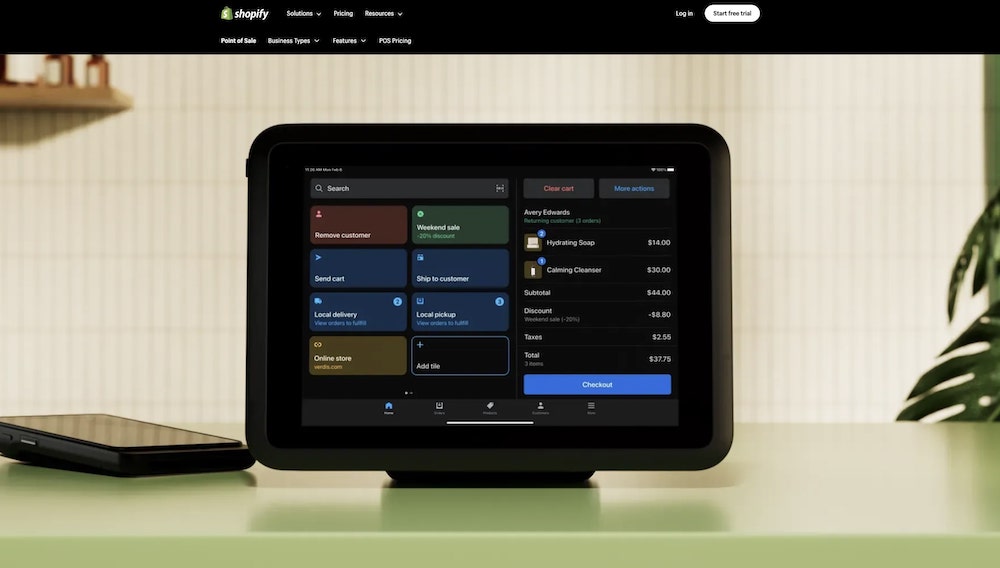
To compare, BigCommerce requires a third-party app integration. There are currently over 30 POS solutions in the BigCommerce app store, including Connect POS, Point of Sale by Webkul, Square POS, and Shopkeep.
Unfortunately, except for Connect POS, most solutions have insufficient reviews or a very low rating. Connect POS costs $49 per month and functions similarly to Shopify POS Pro, plus split or partial payments, tracking orders, and fulfillment management.
Shopify Basic POS is integrated with Shopify Payments and may suffice for small businesses. If Shopify Payments doesn’t work at your store location and you need extended functionalities, BigCommerce wins with apps like Connect POS.
4. Ease of use
Both platforms are rich in features and offer a modern dashboard and streamlined website editor. Their dashboards are full of helpful pointers and tools, but it may take some time to learn how to operate them.
Building a website with the Shopify editor is done through templates and doesn’t require traditional page editing. Regular merchants can launch a simple store in minutes with no coding knowledge.
A big win for Shopify is making complex eCommerce tasks like inventory management and configuring payment processors accessible.
BigCommerce is aimed at entrepreneurs without web-building experience, but it’s less suited for beginners. There are more technicalities in building a BigCommerce website store than with Shopify, which may cost extra time and effort.
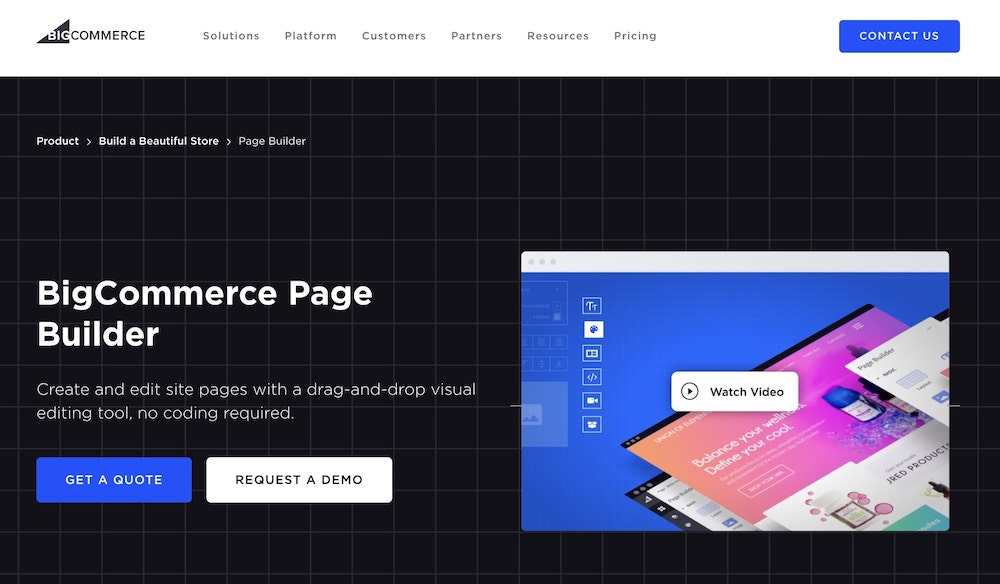
Unlike Shopify, the platform comes with several built-in features from the cheapest plan tiers, saving time for merchants with previous experience.
Shopify is easier to use, making it a top choice for entrepreneurs creating their first online store. BigCommerce’s built-in features have the potential to offer more to those with previous experience.
5. Themes and design options
Easy-to-use and well-designed websites help to gain a competitive advantage and increase sales. 42% of hard-earned traffic will abandon a web page simply because of poor design and functionality.
Shopify and BigCommerce deliver a range of mobile-responsive themes, both free and paid.
Shopify theme store currently has around 12 free plus 144 paid themes, ranging from $170-$380.
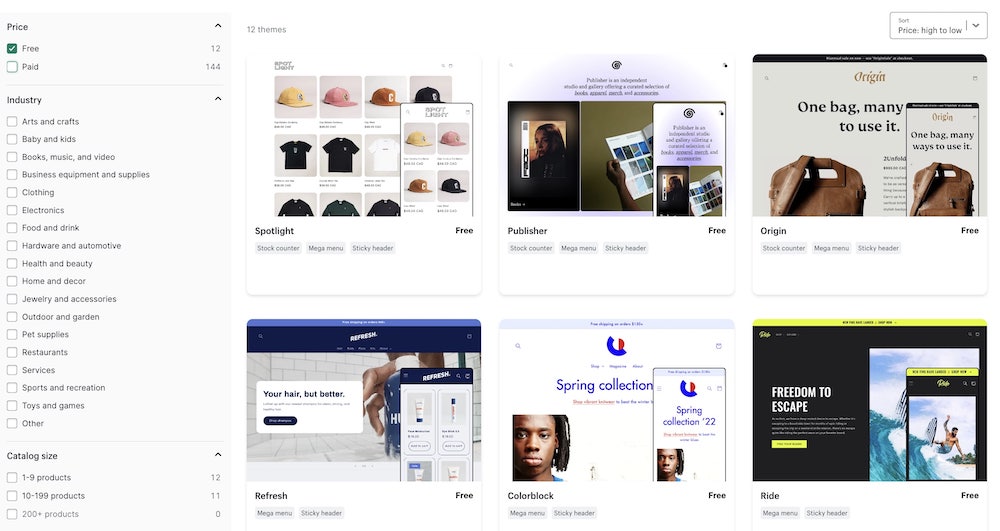
- The platform also gives a drag-and-drop editor to adjust individual theme elements. It requires a medium to steep learning curve.
- Users can test Shopify themes without limits, only paying for them when publishing the eCommerce site. In addition, it’s possible to switch themes without creating an entirely new site.
BigCommerce theme store offers 15 free and around 229 paid options, ranging from $150-$400. Most are fully responsive and AMP-enabled and allow more experienced store owners to edit the HTML and CSS to further customize the design. The platform also offers a simple drag-and-drop page builder.
BigCommerce themes are very similar to each other. There are around five free themes, most of which are the vault and cornerstone themes with different color schemes.
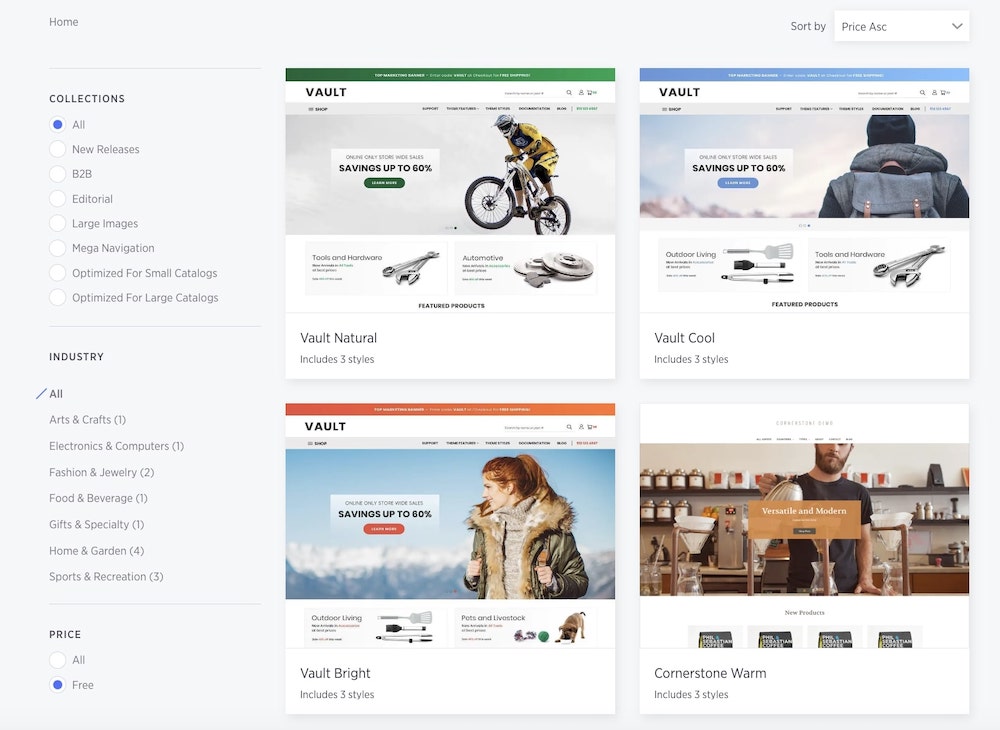
- The theme page urgently needs some improvements. Its navigation is glitchy and has been for over a year, especially while browsing through the theme pages.
Unlike BigCommerce, Shopify offers a wide range of unique themes, and it’s easy for beginners to create an attractive and practical online store.
BigCommerce offers better design functionality and customization only for users with previous technical knowledge, as its themes lag behind.
6. eCommerce tools
There’s a significant overlap when comparing BigCommerce vs Shopify for eCommerce tools. Both offer essential features for all plans, such as:
- Basic shipping tools.
Change rates based on weight or order value, print shipping labels, and set shipping locations. - SSL certificate.
An SSL certificate validates your store as a safe website to purchase from. - Multichannel selling.
Integrate with and sell on multiple sales channels like Facebook, Instagram, or Etsy. - Inventory management.
Track inventory, analyze order trends, and manage stock.
BigCommerce has a range of sales features built into the platform, but its app store is much more limited.
Some valuable features are built-in on BigCommerce, whereas Shopify supports them only via external apps.
While BigCommerce offers better built-in eCommerce tools, the sheer range and availability of apps in Shopify’s app store can’t be understated.
BigCommerce apps are helpful, but with a much smaller app store, there is not as much extra functionality to help you increase growth.
7. Marketing features
![Marketing Features BigCommerce vs Shopify [bp_year]: Choosing the best for you 1](https://printify.com/wp-content/uploads/2020/07/Marketing-Features.jpg)
With Shopify and BigCommerce, you’re responsible for driving traffic to your store. Both eCommerce platforms offer marketing tools to find new customers, reconnect with buyers, and increase sales.
Shopify has a range of essential features to support your chosen marketing strategy, including SEO, content marketing, and Shopify email marketing campaigns. These basics are complemented by over 1,855 marketing-related apps.
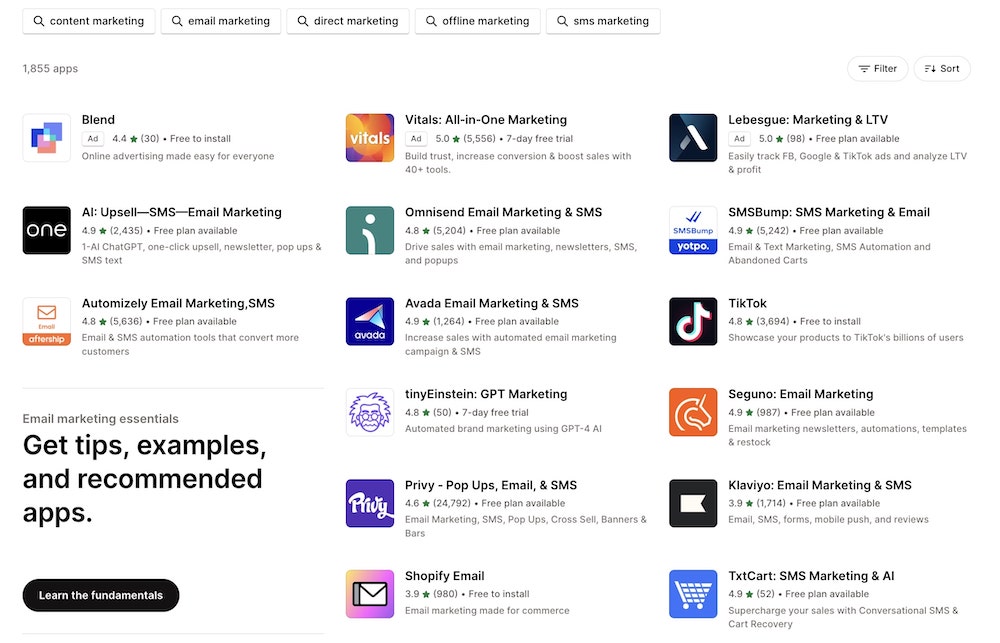
- BigCommerce has more built-in marketing features than Shopify. Every plan offers discount codes, reporting tools, and one-click integration with Google Shopping. Advanced plans also offer segmentation tools to personalize the customer experience and automated abandoned cart emails.
Shopify offers more marketing tools through its app store, while BigCommerce has more built-in features. Shopify offers a wide range of marketing tools to complement diverse strategies for merchants confident with different marketing methods.
8. SEO
With over 70% of search engine users only concentrating on organic results, SEO is one of the most effective strategies to increase sales.
In the BigCommerce vs Shopify comparison, both have solid SEO features and apps allowing you to maximize content for search engines using keywords. However, you won’t have full customization since they are closed platforms.
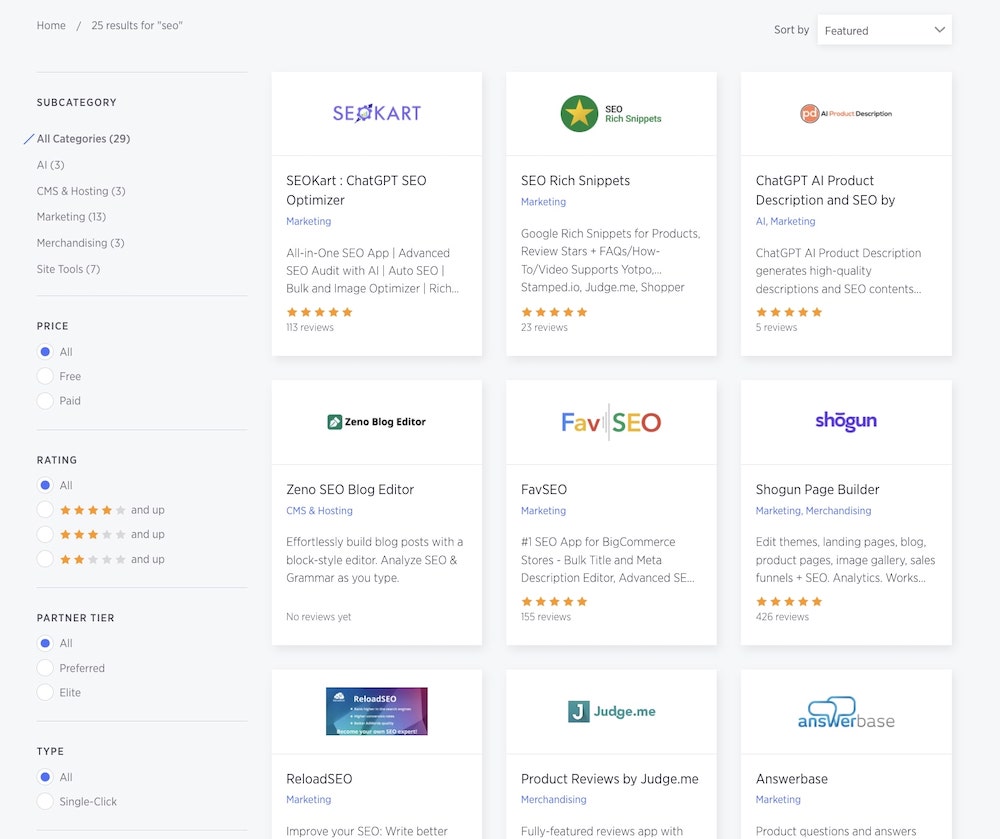
All plans have automatic site maps, customizable metadata, URLs, and title tags to improve both BigCommerce and Shopify SEO quality. You can also find apps for writing product descriptions with ChatGPT in their app stores.
If you’re thinking of investing in content marketing to rank higher in search engines, both platforms have limited blogging capability.
Shopify’s native blog doesn’t give you basic features like uploading galleries, sharing blog posts, inserting buttons, following tags, or commenting without third-party apps.
BigCommerce solves this kind of blog issue by letting you connect an external WordPress blog on the platform.
Both BigCommerce and Shopify offer similar options to optimize your store’s SEO, mainly through apps. Shopify has an edge since its app store contains around 640 SEO apps, while there are only 25 for BigCommerce.
9. Apps
Apps are a crucial way to expand the functionality of both platforms.
Many of the best Shopify apps are free, with over half of them requiring payment.
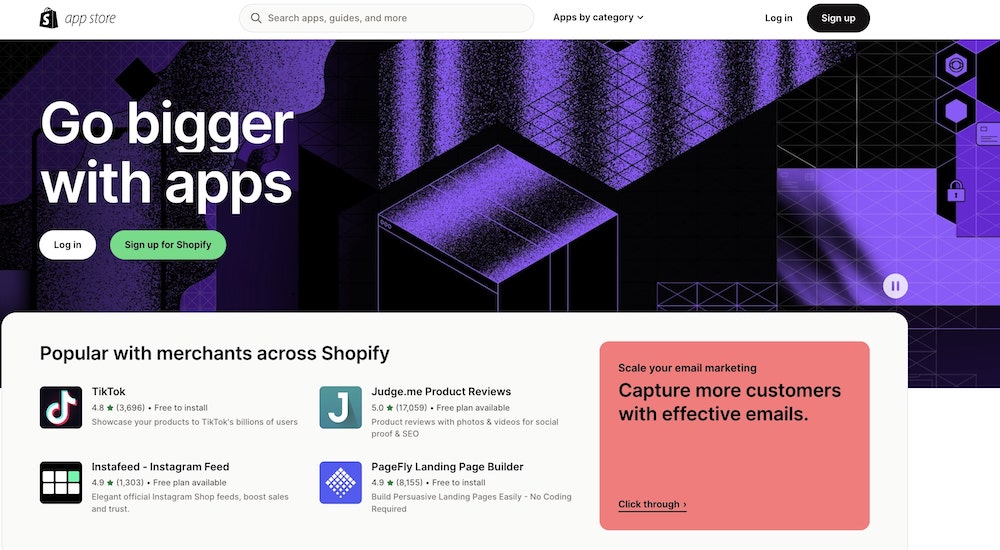
Many apps in the BigCommerce store are also free, but the disparity in availability means Shopify apps offer a more specialized service and a wider range of functions and capabilities.
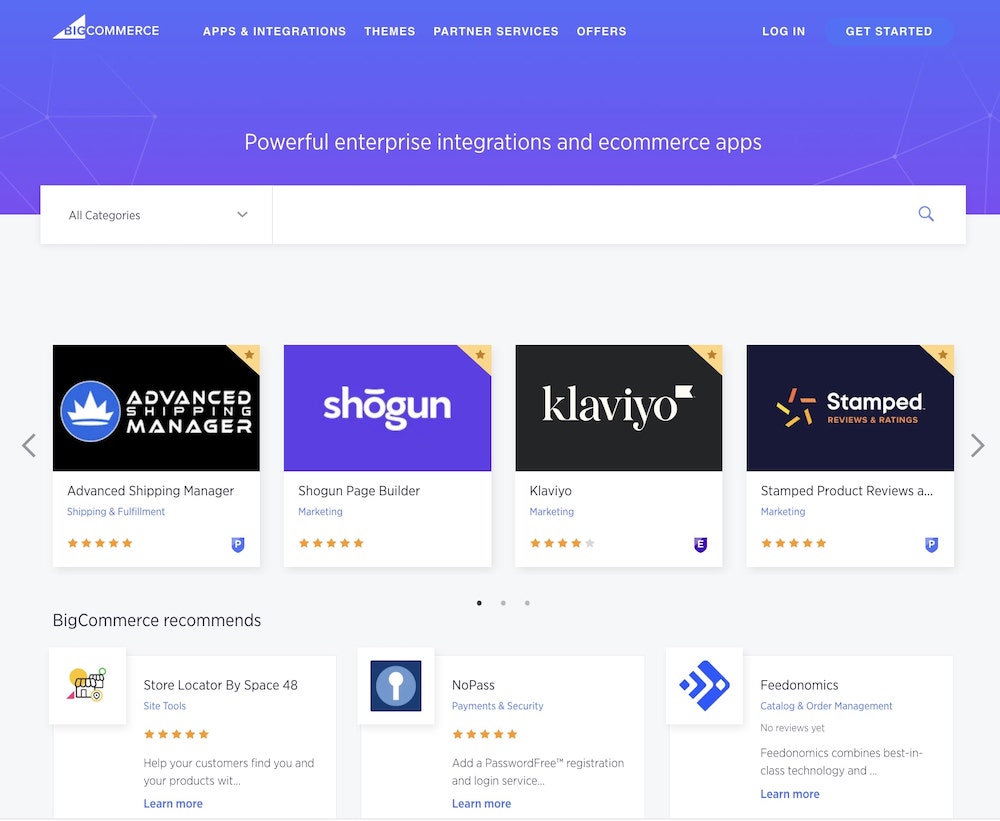
Remember, Shopify depends heavily on apps when BigCommerce has more built-in features from the start. With time, this may add costs and even slow down a Shopify store.
The extra functionalities offered by the Shopify app store can help merchants manage their eCommerce space, improve user experience, generate more traffic, and increase sales better than BigCommerce. However, this comes at a cost.
10. Analytics
![Analytics BigCommerce vs Shopify [bp_year]: Choosing the best for you 2](https://printify.com/wp-content/uploads/2020/07/Analytics.jpg)
Accurate analytics can be crucial in driving the growth of your eCommerce store. You can analyze the sales process and use detailed analytics to target customers with effective marketing campaigns that increase sales.
BigCommerce and Shopify platforms offer a range of analytical tools. This includes the ability to analyze sales data on individual products, sales channels, currencies, discounts, returns, and the average revenue per order. You can also track marketing performance data.
Shopify Plus and Advanced plans offer customized reporting, while BigCommerce offers a paid eCommerce insights report. This extra data focuses on shopping carts, products, and customers. However, this plan is $49 for BigCommerce Standard and Plus, $99 with Pro, and $249 with Enterprise.
Both platforms are balanced with their detailed analytical reports and can provide reliable data to grow your store.
![Shopify analytics apps BigCommerce vs Shopify [bp_year]: Choosing the best for you 3](https://printify.com/wp-content/uploads/2023/10/Shopify-analytics-apps.jpg)
11. Customer support
Effective customer support makes an impact if you have problems setting up and operating your eCommerce store. No matter which platform you pick when building your new shop, you’ll have access to:
- 24/7 phone support.
- 24/7 live chat support.
- Help center.
- Community forum.
- Email support.
- Video tutorials.
BigCommerce’s help center is full of useful information, while Shopify has helpful prompts that link to the relevant pages throughout the dashboard. These features assist in finding immediate support without needing to reach out.
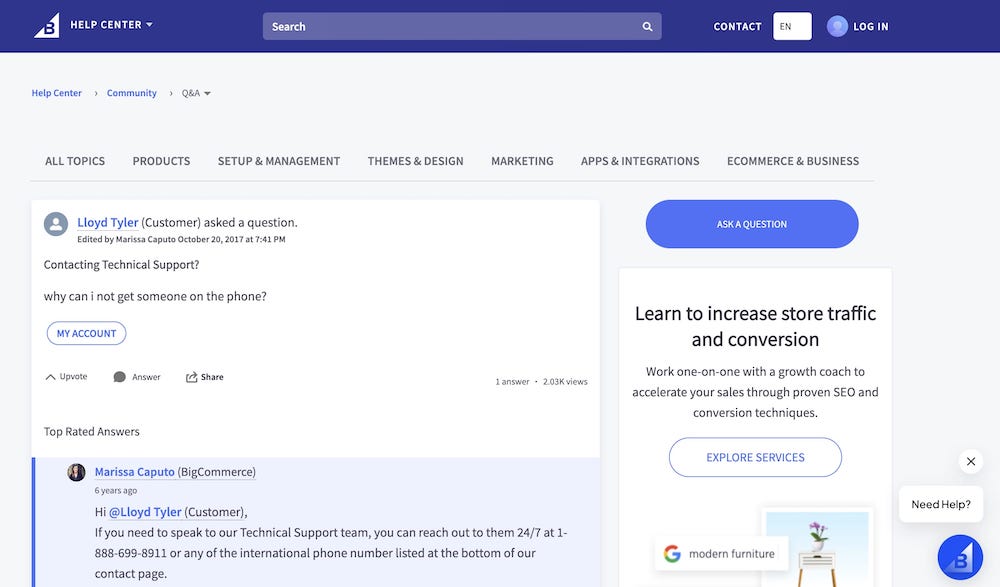
Both platforms offer priority support for the most expensive plans:
- With BigCommerce, you get an onboarding consultant and receive priority treatment when requesting phone support.
With Shopify, you get access to a dedicated customer support agent.
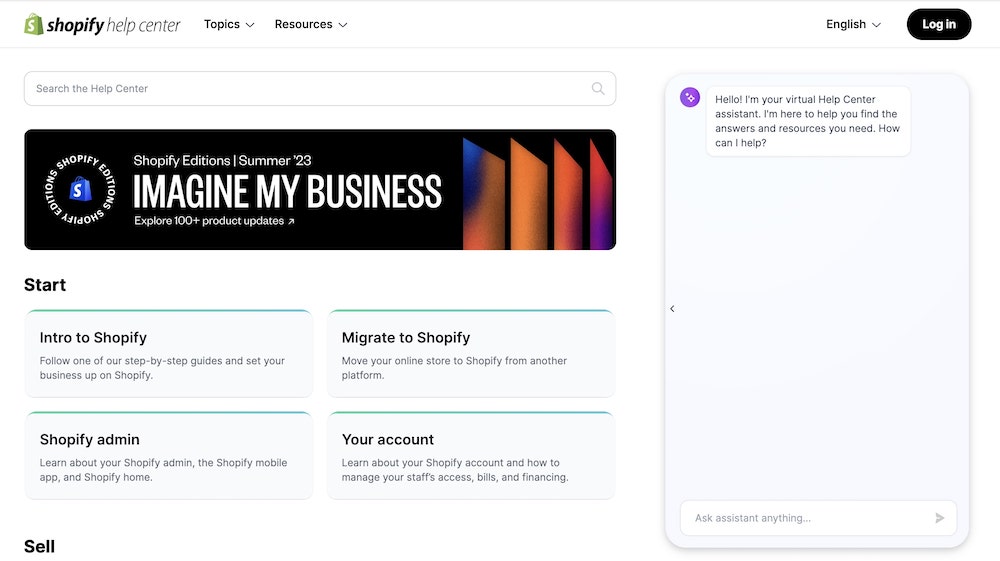
Overall, both platforms offer 24/7 live chat and phone support. Shopify’s knowledge center offers tips, and its community forums are more active, which can be an advantage if you have issues operating your online store.
FAQ
BigCommerce can have the edge for entrepreneurs who are confident in web building or already have experience with editing HTML and CSS. Pick BigCommerce if the following speaks to you:
- Looking for built-in features without the hassle of adding apps.
- Want more design functionality for your store’s branding.
- Run an online business looking to grow across multiple channels.
Shopify can be the best choice for merchants setting up their first store and will benefit from the wider range of apps available. Choose Shopify if the following applies to you:
- Want more control over your website’s features.
- Looking for as much choice as possible between third-party apps.
- Would like to offer a large inventory.
Both Shopify and BigCommerce offer the ability to build your store and sell digital or physical goods or services online. Each uses a browser-based system, so you don’t have to download software to use the sales channel.
Shopify relies heavily on third-party apps to expand functionality, while BigCommerce has a larger number of built-in features.
Shopify and BigCommerce compete fiercely for a leading eCommerce position and offer plans at the same prices, ranging from $39 to $399 monthly.
- Plans are mandatorily upgraded to a higher tier after BigCommerce users reach an annual threshold.
- BigCommerce free themes are very similar to each other and, in many cases, have an outdated aesthetic. Its theme store also needs urgent reformulation.
- There are a relatively small number third-party apps in comparison to Shopify.
BigCommerce vs Shopify: Conclusion
Both platforms are based on a straightforward content management system and can create professional online stores. Deciding which option is best for your business may depend on your expansion strategy.
- Shopify stores can be expanded almost without limit through apps. However, having an eCommerce platform dependent on third-party solutions could imply future problems with increased costs.
- BigCommerce, on the other hand, has more built-in solutions and an edge on advanced-plan tiers, but this implies expanding the store through a plan-level increase. Entrepreneurs interested in acquiring specific functions will have fewer options in apps.



